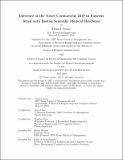Inference of the Novel Coronavirus 2019 in Patients fitted with Boston Scientific Medical Hardware
Author(s)
Ayane, Daniel
DownloadThesis PDF (8.229Mb)
Advisor
Retsef, Levi
Gray, Martha
Terms of use
Metadata
Show full item recordAbstract
As Boston Scientific’s Rhythm Management business is challenged by an increasingly commoditized market it is important to find new opportunities to diversify the products and services that the company offers. Traditionally, as a medical device manufacturing company, this differentiation comes in the form of hardware features but in the wake of a data revolution, the company seeks opportunities to diversify beyond hardware.
By utilizing Boston Scientific’s physiological time series data from Heart Failure therapy devices such as pacemakers, we aim to determine if an algorithm can be built to anticipate worsening COVID-19 symptoms in real time in patients and therefore provide them with better healthcare solutions by intervening in a timely manner.
Since the study includes a relative small number of patients with clinically established COVID-19 labels, we leverage the power of semi-supervised learning to extract useful signals and characterize the profile of COVID-19 in Boston Scientific Heart Failure patients. Specifically, we utilize constrained K means clustering to understand if there are any cardiovascular signals that are associated with COVID-19 in heart failure patients and then create pseudo labels that can be used to train an LSTM in a supervised fashion. We produce two models with the best model achieving a median alert rate of 3.8 Days with an unexpected alert rate of 3.8% and 93.3% specificity and a 99.7% sensitivity.
This study is meant to be a proof of concept to help define a future product that can be rolled out across Boston Scientific’s LATITUDE product line.
Date issued
2023-06Department
Massachusetts Institute of Technology. Department of Electrical Engineering and Computer Science; Sloan School of ManagementPublisher
Massachusetts Institute of Technology